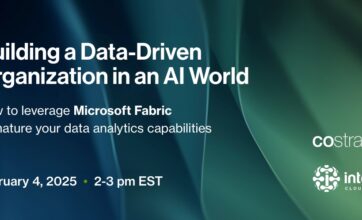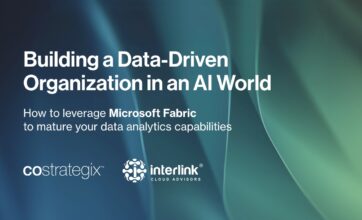Are You Ready to Hire a Data Scientist?
- 5 minutes read
Data scientists are experts at answering business questions with data. They may use tools such as machine learning, deep learning, artificial intelligence, and natural language processing. They help organizations to respond to market conditions quickly with predictive analytics, or prescriptive analytics. Not surprisingly, companies of all sizes, stages, and industries find themselves asking whether they should hire their first data scientist or begin building a data science team.

How do you know that you’re ready to hire a data scientist? The answer lies in your ability to assess two things accurately: 1) Your data maturity, and 2) Your organizational and operational readiness for data science.
Assessing Data Maturity
An organization often senses its level of data maturity in the form of friction or the amount of effort it takes to utilize your data. A simple whiteboard exercise can provide a high-level visual of your organization’s data maturity.
- First, draw all your data sources and the connections between them. What do you see? How many manual spreadsheets or human inputs are there? How many transactional data stores are there? Are there silos? How much duplication is there?
- Next, add your outputs to the diagram. Now, what role are spreadsheets playing? How many legacy reporting or business intelligence (BI) products make up your tools? Furthermore, what about the state and form of the sources on the whiteboard?
What you’re trying to assess from this exercise is the effort required to make your data usable to a data scientist. While many data scientists can wrangle your data, this is not the most efficient or cost-effective use of their time. Too much time spent with your data sources and pipelines might also lead them to become bored or disengaged. When you have a plumbing problem, you call a plumber, not a bartender. Yes, the bartender may use water to mix his drinks, but the bartender will assume that the water is already available at the tap. Similarly, you hire a data engineer to fix your data plumbing first, and only bring in the data scientist once the data is flowing through the pipes and ready to use.
Readiness for Data Science
Data Gaps and Latency
In addition to assessing your data plumbing and the quality of the data flowing through it, you should also examine the processes and events that give rise to your data. You will need to consider any gaps in your data before hiring your first data scientist:
- Do the events that generate your data happen frequently, repeat often, or have been observed over many periods and across multiple locations?
- For example, customers buy staples and perishables in grocery stores more regularly than healthcare or beauty items.
- Do the events that generate your data happen infrequently, or are limited in scope?
- High-cost items – like TVs, tractors, or houses, and many B2B products – are purchased less frequently. Events like bankruptcy, natural disasters, or financial crashes are rare.
The higher latency, or less data you have about what you are trying to predict, the harder it will be for a data scientist to turn that data into patterns and predictions. Therefore, eliminate a common risk of adding a data scientist to your payroll by consulting with an expert about closing those gaps first.
Justifying the Spend
Understanding why you want to hire a data scientist in the first place will help you to match the appropriate data science specialty to your purpose. But still, data scientists are an expensive hire. One way to justify the compensation is to define the financial benefit that the data scientist’s success will bring. What is the potential upside you can expect from this role?
Also, you will want to consider the amount of work you have for a data scientist. Do you need to hire someone full-time, part-time, on a contract basis, or on a consulting basis? List your ongoing needs to help determine the best type of resource to hire. If you plan a full-time hire, you want to ensure enough projects exist to consume their capacity without too much downtime.
Finally, have you set aside a sufficient budget to see your data science experiments and solutions through to implementation? While open source and cloud technologies have reduced costs, other areas of data science can still be quite expensive. Investments in new tools, data collection/acquisition, and the delayed benefits inherent in the sometimes iterative and experimental data science process, means your fledgling data science initiative can spend multiple periods in the red. It is wise to build quick and early wins into your planning to offset those costs. Early successes will allow you to show progress to senior leaders and give your new data scientist a sense of achievement and contribution.
Cultural Considerations
Another aspect of readiness to consider is culture. Will the data scientist be met with resistance from a team that values experience and subject matter expertise? Will lack of peers and the requisite technical support make them feel further isolated? What about your organization’s data literacy? Is there a common language, or will your first data scientist also have to spend time educating their peers? As with data maturity, having a data scientist spend their precious time managing your culture is not the best use of an expensive resource.
Ultimately, building a data team and knowing the right time to add a data scientist is about understanding your organization’s current and future needs. That way, when the time comes for you to hire a data scientist, you can hire the right person and ensure their transition to your team is successful and lasting.
Considering getting started with data science? CoStrategix can provide you with the right mix of consulting, tools, and resources to ensure their long-term data science success. CoStrategix offers strategy and assessment engagements to assess readiness, identify opportunities, and plan your data analytics execution. If you’re not ready to hire a data scientist full-time, CoStrategix can provide a dedicated data team, including highly experienced data science experts and engineers, for just the hours and projects you need. Contact us to learn more.
AI Strategy & Solutions – Elevate your business with advanced analytics
Data & Insights – Drive insights that lead to competitive advantage
Product Development – Build platforms that power unique digital capabilities
Platform & Technology Modernization – Modernize for stellar experiences, efficiency, and AI
Related Blog Posts
Composite AI: The Smarter Way to Navigate AI Complexity
March 4, 2025
Building a Data-Driven Organization for an AI World 2
February 5, 2025
Building a Data-Driven Organization for an AI World
February 4, 2025







